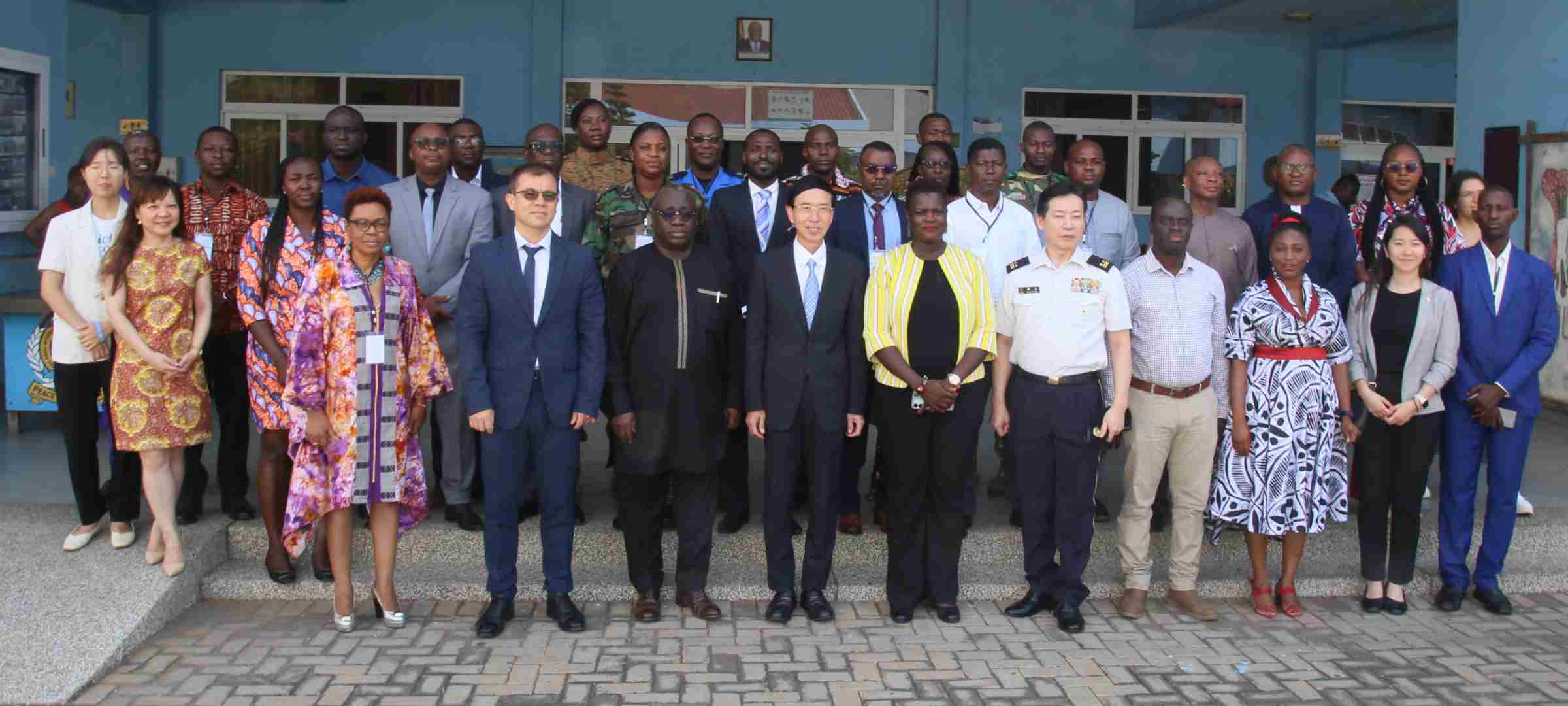The Kofi Annan International Peacekeeping Training Centre (KAIPTC), leading a collaborative effort with the Government of Japan and the United Nations Development Programme, has commenced a 10-day capacity building course on ‘Preventing Violent Extremism, Radicalization, and Small Arms Proliferation in the Sahel and adjoining Coastal Countries in West Africa’.
The 10-day training commenced on Monday 13 November, 2023, at the Games Room of KAIPTC – the Economic Community of West African States (ECOWAS) Training Centre of Excellence (TCE) – with the Director, Faculty of Academic Affairs and Research (FAAR), KAIPTC – Professor (Prof) Kwesi Aning, and the Japanese Ambassador to Ghana – His Excellence (HE) Ambassador Hisanobu Mochizuki reechoing calls for urgent attention to security in West Africa.

With statistics from the 2023 Global Terrorism Index on the Sahel region from 2007 to 2023, Prof Aning revealed an alarming surge in terrorist activities in the Sahel, where in 2007, the Sahel region accounted for just 1% of the global death toll due to terrorism, but by 2023, this figure had skyrocketed to a staggering 43%.
The security analyst said the Middle East and Maghreb, long associated with significant terrorist activity, have been surpassed by the Sahel region, which now experiences a higher concentration of terrorist incidents and resulting casualties, one most concerning aspect being the spreading footprint of violent extremism.
Burkina Faso, in particular, has seen a significant increase in attacks, with 58% of all incidents in the Sahel occurring within its borders, with repercussions of this violent activity not confined to the Sahel alone, with ripple effects reaching littoral countries, including Cote d’Ivoire, Benin, and Togo, and growing concerns about its potential further expansion into Ghana.
Prof Aning said the happenings underscores the urgent need for collaborative, regional efforts to address the root causes and consequences of violent extremism (VE) and terrorism, and deepening of cross-border collaborations, to stem the tide of violence, promote peace, and secure a more stable future for the Sahel and its adjoining coastal countries.
VE groups source their weapons from looted military facilities in Mali, Niger, Burkina Faso, and through stockpile leakages from mines, and since 2017, there has been a southward and eastward expansion of Improvised Explosive Devices (IEDs), with designs and components originating in West Africa, now being employed as far away as the Central African Republic, the Professor asserted.
The FAAR Director continued that the ‘Preventing Violent Extremism, Radicalisation and Small Arms Proliferation in the Sahel and adjoining Coastal Countries in West Africa’ project has an objective to enhance knowledge and foster information-sharing among security personnel and civil society actors in the fight against terrorism, violent extremism, and the proliferation of small arms in seven West African nations: Benin, Togo, Ghana, Cote d’Ivoire, Niger, Mali, and Burkina Faso.
Through capacity development, training of trainers, and a regional policy and experience-sharing seminar, the course aims not only to fortify the activities of the Accra Initiative, but also to build upon past successes in Small Arms and Light Weapons (SALW) interventions and border security, Prof Aning said.

He said moreover that, the objectives of this Capacity Building Course is to enhance knowledge and awareness of initiatives like the Accra Initiative, and to facilitate information sharing among security personnel, stockpile managers, and armorers.
The 10-day intensive training course further aims to boost local efforts to enhance security, and empower civil society in the fight against terrorism, VE, and the proliferation of small arms, securing the African continent.
HE Ambassador Hisanobu Mochizuki, taking his turn at the opening ceremony said, to safeguard civilians and further human and economic progress, substantial efforts are necessary to address the fundamental causes of insecurity in the Sahel and adjoining coastal countries.
The Ambassador continued that the project will promote capacity development, training of trainers and regional policy and experience-sharing, in a way that can contribute to enhancing the activities of the Accra Initiative.
He said Japan is supporting the project with an amount of Four Hundred and Ninety-One Thousand Nine Hundred and Forty United State Dollars (USD491,940.00), having provided a cumulative total of about 10 million US dollars to the KAIPTC to date, to support numerous projects including training in small arms control, police capacity building and border security management.

The Ambassador continued that during the Japanese Prime Minister Kishida’s visit to Ghana in May 2023, he announced that Japan will provide approximately 500 million US dollars over the next three years, to contribute to peace and stability and promote sustainable growth in the Sahel region, and the neighboring coastal countries of the Gulf of Guinea (GoG).
Japan expects that its new commitment, alongside others, will contribute to curtailing the spread of terrorism and violent extremism and build human security as well as the resilience of individuals in the Sahel areas, Ambassador Mochizuki stated.
He concluded that Japan’s history of rebuilding from the destruction of World War Two (WW II) in the 1940s, has instilled a deep appreciation for the value of peace, and has driven the nation to adopt an active stance in contributing towards global peace and security.
Present was Mr. Sukhrob Khoshmukhamedov – Deputy United Nations Development Program (UNDP) Resident Representative,
By Kofi Ampeah-Woode
